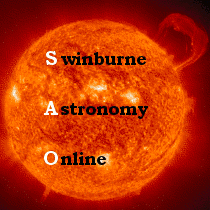Relativistic Cosmology
Relativistic cosmology is the description of the expanding universe based on general relativity. First introduced by Einstein in 1917 and developed in the 1920s by Alexander Friedmann, Georges Lemaitre and Willem de Sitter, the equations of relativistic cosmology use the density parameters of matter (both baryonic and dark matter) and dark energy to predict the evolution of the expanding universe.
Although it has been around for a while, there are many outstanding questions in relativistic cosmology:
- Is the universe open, flat or closed?
- What caused the inflationary epoch?
- What is the nature of the dark matter?
- What is the nature of the cosmological constant?
Research into relativistic cosmology will therefore continue for many years to come.
Study Astronomy Online at Swinburne University
All material is © Swinburne University of Technology except where indicated.

